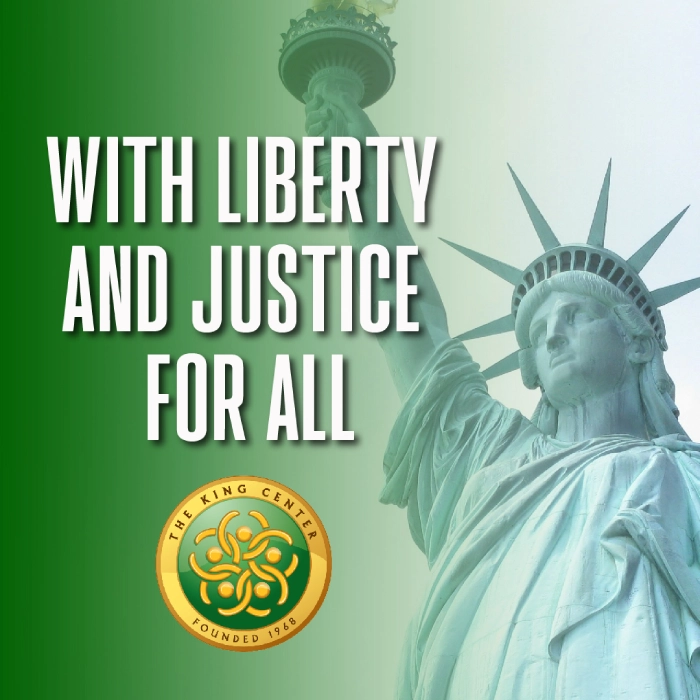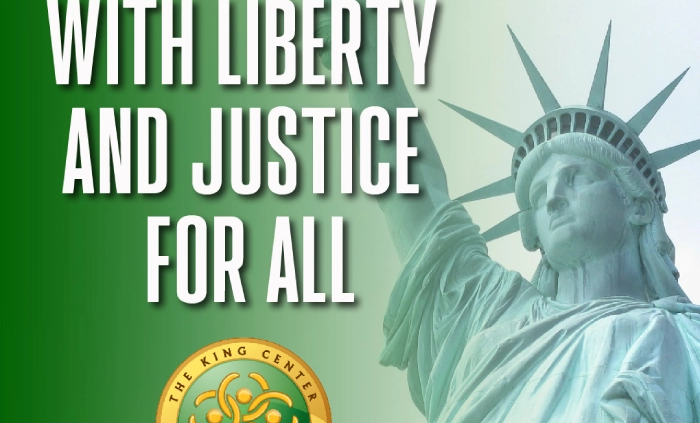With Liberty and Justice for All

“Our hope for creative living in this world house that we have inherited lies in our ability to reestablish the moral ends of our lives in personal character and social justice. Without this spiritual and moral reawakening, we shall destroy ourselves in the misuse of our own instruments.” – *Where Do We Go From Here: Chaos or Community*, Dr. Martin Luther King, Jr.
As the United States transitions to a new presidential administration, The King Center acknowledges the election of Donald J. Trump as the 47th President of the United States. We, as a team at The King Center, wish for success in his leadership and for his administration. We urge his administration to strive toward creating a more just, humane, and equitable nation for all Americans. It is our hope that this new chapter in our nation’s history will be marked by efforts to bridge divides, uplift marginalized communities, and uphold the principles of justice and equity that are the cornerstone of our democracy.
At this pivotal moment in history, our nation faces an urgent need for strong, compassionate leadership—leadership that chooses love over hate, unity over division, and compassion for the marginalized, while showing respect, not favoritism, for the privilege. The reality of our nation has been laid bare. We live in a society where racism, classism, fear, bigotry, and absolutism still plague us, and where we’ve lost the ability to engage in civil discourse that respects our common humanity.
Our political climate has become increasingly divisive, to the point where the idea of being “one nation, under God, indivisible, with liberty and justice for all” feels like a distant memory—a principle that once symbolized the American ideal but now seems out of reach. In light of the recent election, it is important to recognize there are serious concerns amongst some Americans—particularly minorities, women, and marginalized communities— about their futures under a Republican administration that may represent a more predominantly white male perspective. These fears are not to be dismissed, but rather heard, acknowledged, and addressed as we shape policies that affect the lives of all citizens.
Dr. Martin Luther King, Jr. once warned, “Nothing could be more tragic than for men to live in these revolutionary times and fail to achieve the new attitudes and the new mental outlooks that the new situation demands.” We are living in revolutionary times, where the challenges we face—economic inequality, a crumbling infrastructure, and an escalating climate crisis—demand bold, transformative change. Addressing these issues with wisdom, compassion, and a sense of urgency is crucial. Failure to do so risks exacerbating the divisions that imperil our democracy and the well-being of our most vulnerable populations.
To live up to the ideals of this nation, it is crucial that we, as citizens, hold our leaders accountable for their actions. Democracy’s strength lies in the principle that every person has a seat at the table, and it is our collective responsibility to protect and nurture that right.
As we look toward the future, it is imperative that we remember the enduring power of nonviolence and the transformative force of love. Conflict is an inevitable part of the human condition, but it does not have to define us. In the face of disagreement and division, our task is to pursue justice, seek compromise, and work together to build the Beloved Community—a society where dignity, equality, and mutual respect are at the forefront.
Even amid our challenges and disagreements we must do the work of justice and find compromises that will help us build the Beloved Community together. The work ahead will not be easy, but it is necessary for the survival of our democracy.

